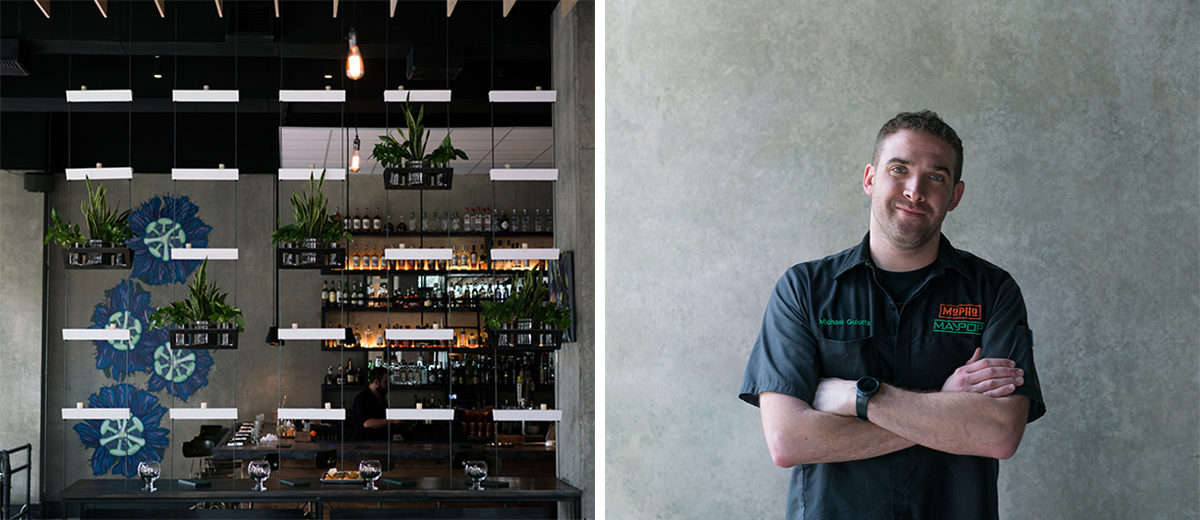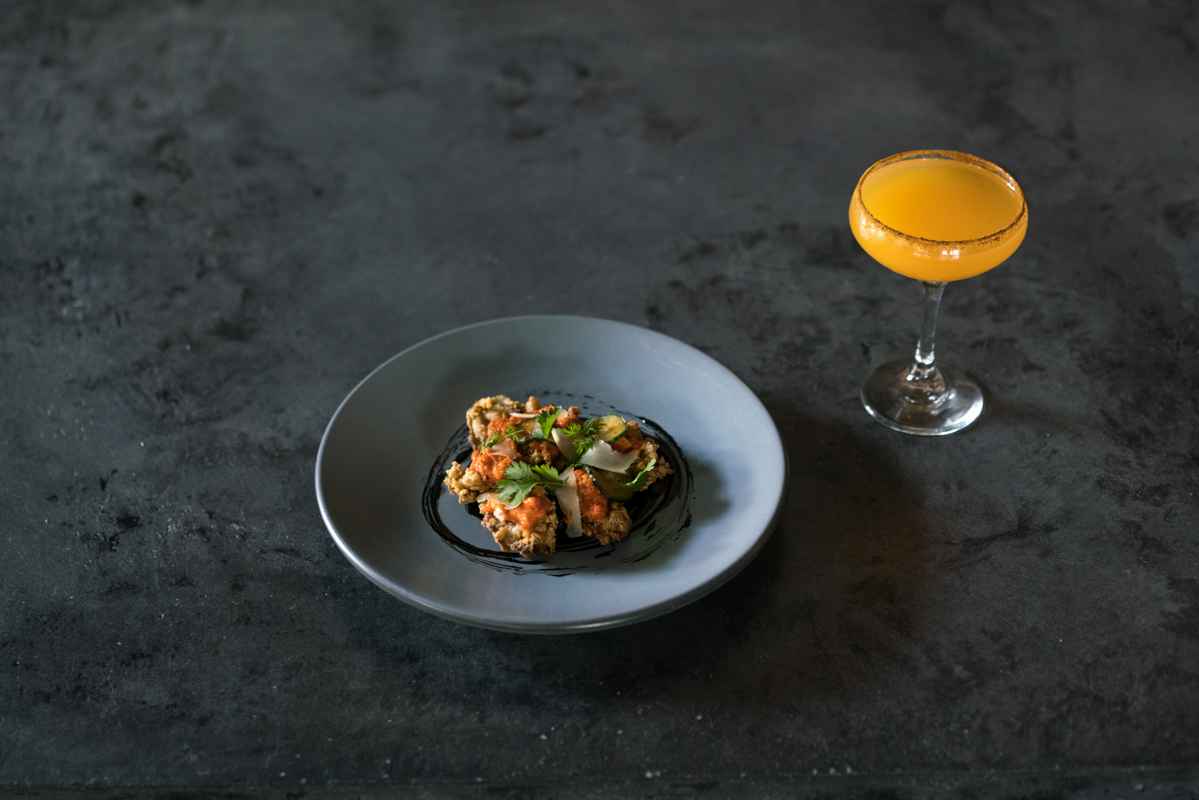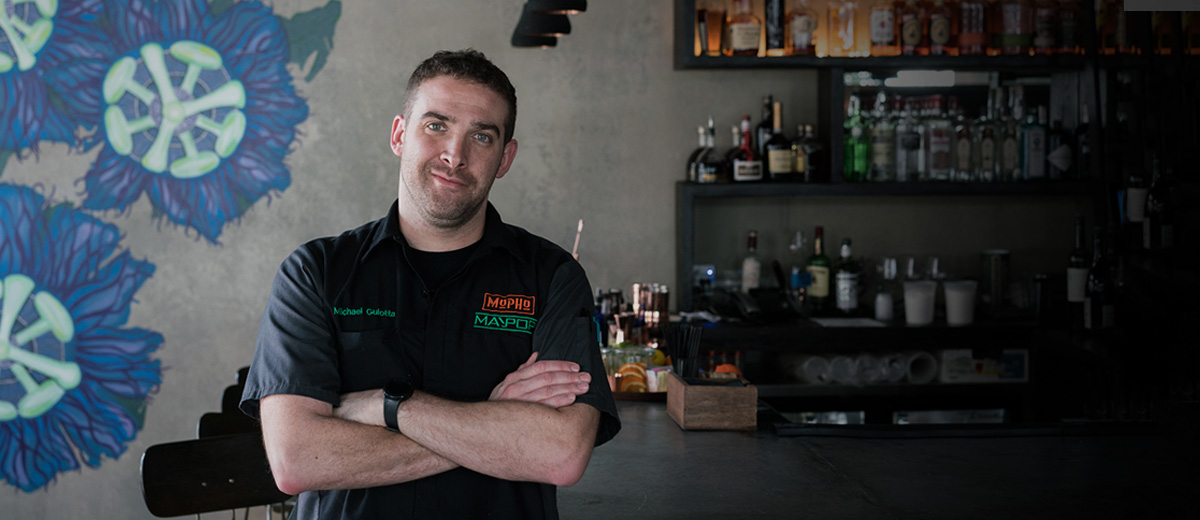Michael Gulotta is the James Beard-nominated owner and chef of MoPho and Maypop (Check out our feature on the latter), two New Orleans restaurants that feature Gulotta’s trademark collision of southern flavors and southeast Asian dishes. He came up through John Besh‘s legendary restaurant August, before spending years travelling in Europe and refining his techniques. He returned to New Orleans, and August, after Katrina, in 2007. As CDC at August, he cemented his reputation for turning out just really, really delicious food.
Shortly after he joined us in Miami for A Night At The Mansion, we caught up with Michael in the middle of a whirlwind week to talk about his journey and his approach to food.
The way you got into cooking is a pretty famous story by now. Tell us if we get anything wrong: You got into a car accident when you were a senior in high school. You had to start working immediately to pay for repairs, and your brother was able to get you a job at Planet Hollywood. You loved the kitchen and enrolled in culinary school just a few months later. Tell us, had you been planning to go to culinary school prior to that experience, or did that accident dramatically change the course of your life?
I was already planning on going to culinary school, the car accident just sped things up. I have been obsessed with food for as long as I can remember and used to tape cooking shows throughout high school. I just wasn’t sure where I wanted to go, but I couldn’t afford any of the more well-known culinary schools. I found out I could attend Nicholls State University’s John Folse Culinary Institute for free due to the Louisiana TOPS scholarship. I was able to get a four year degree and get out debt-free. This played a significant part in the opportunity I had to work at great restaurants for very low pay and to afford two trips to Europe to work and study.
What were some of the biggest challenges you had to overcome in your early cooking career?
Leaving my stress and worries at the door. If you want to get ahead in restaurants, at least back in the late 90’s/ early 2000’s, this was true, you can’t be bothering your chef, teammates, or guests with your personal problems. Your team wants a problem solver, a stoic, someone who is fully present physically, mentally, emotionally. Especially if you are trying to make it in a top tier kitchen.
After a couple smaller jobs around the states, you moved back to New Orleans, determined to land a job at August. What was it about August that compelled you to keep pressuring them for an opportunity?
I dined at August the first few months after it opened and it was the first time I had food that truly inspired me. The food at August was focused and the technique was solid. I was eating dishes where I didn’t know how to prepare what I was being served, I didn’t recognize the terminologies, I didn’t know the cuts of meat or how to prepare them. I craved that knowledge.

What are some the most important things that John Besh taught you while working for him at August?
Put yourself in your guests’ shoes and inspire your team. John would give nightly speeches to the team to get them pumped up for service, going over strengths and weaknesses of each line member so we could be successful. He also taught me to taste every dish from start to finish before I put it on the menu (dishes change as they are eaten all the way through). Taste, taste, taste, taste. And read, read cookbooks, do your research, build your vocabulary.
What was the process like when you finally opened your first restaurant, Mopho?
Terrifying. It feels like free fall with no net, tempered with being strapped to the front of a Formula One car. You can’t quite tell your trajectory. Are you screaming towards victory — a successful restaurant — or falling to you figurative death — bankruptcy and admitting that you didn’t quite know what you were doing. All the while, you’re trying to figure out the accounting, payroll, city taxes, state taxes, payroll taxes, rent, upkeep, service contracts, credit card processing fees, and every other little thing that eats away at your bottom line that you never really knew anything about until you became an actual owner. And at the same time, you’re trying to motivate your staff to tell a story through their food and service, one that is compelling enough to keep guests coming back, and even more, telling their friends to come back. And you still can never tell, restaurants operate on a day-to-day basis, their overhead is so high that if business slows down significantly for even five days a team can be looking at a fatal cash flow problem. We put MOPHO’s loans on us, we wanted it to be ours as a business team, we didn’t find a huge backer that would own the majority forever. We owe the bank, we took the major risk, hoping for the major reward of owning it all ourselves some day. We just live a little poorer and work a little harder in the short term.
Where does the Southeast Asian influence in your cooking come from?
In New Orleans, our only real ethnic cuisine left is Vietnamese (and later Honduran). New Orleans has this amazing ability in that it assimilates all cultures. There is no real Little Italy or German Town. There are remnants, but people don’t keep their cultural identities here; they are all happy to just be New Orleanians. The Vietnamese are the latest to join the city (followed now by the Hondurans), so their cuisine and culture has not yet been fully assimilated. So it stood out to me while I was growing up in NOLA. It was different. Its flavors were fresh and exciting, and the more I researched, the more I realized our cuisines shared some major influences. Namely, both were former French colonies and both had tropical river deltas. So it became the piecing together of these cuisines, starting with their commonalities and then plugging in the disparate parts, that really got me excited. I never planned on making it a major focus of my career, but when we found the spot for MOPHO, we knew we wanted to do a restaurant for service industry workers. It was and is a tradition that all servers, bartenders, and cooks would eat Vietnamese on their days off, so that became the driving focus of our restaurant, and my business partners and I just jumped out of our comfort zones to make it happen. We just worked hard on it, took their culture seriously, and showed it respect. Slowly we started figuring things out: how to make proper boba tea that then morphed into boba tea cocktails, how to make curries by hand in mortar and pestles, how to work with shellfish paste and fermented bean curd. We still struggle with making proper ca phe sua da. It’s been a wild ride, one that none of us ever expected, but it has opened so many doors.

Your food has been described as tasting “exactly like you think it will taste, but better.” Everyone wants to make delicious food. How do you make yours so consistently stand out?
Taste, taste, taste. Have the patience to tinker with the flavors of a dish until it is hitting on all cylinders, then change it again a day later. Look for that balance of flavor and texture. Make sure it stays exciting from the first bite to the last. Hide little gems of flavor in a dish that a guest isn’t expecting and then discovers halfway through.
What advice do you have for young chefs looking to make their mark?
Spend the time to learn your craft. Cooking is a craft and a science; there are rules that need to be understood before they can be bent or broken, and you have to practice and practice until you can do it in your sleep and then explain it over the phone to a sous chef in such detail that they can execute it successfully because you can’t be there yourself. If you don’t want to burn out, then make sure you’ve got a deep bench of experience and technique to fall back on for those times when the stress of making payroll and paying taxes is so high that you don’t even want to think about food. Allow yourself to be consistently pushed out of your comfort zone. It’s the only way to grow, because nothing is further out of your comfort zone than opening your first restaurant.
Create a free Chef’s Roll profile today to join our global community!


